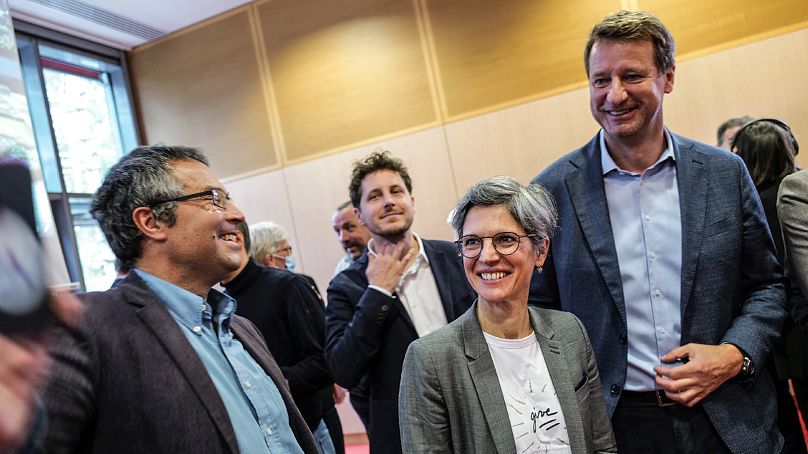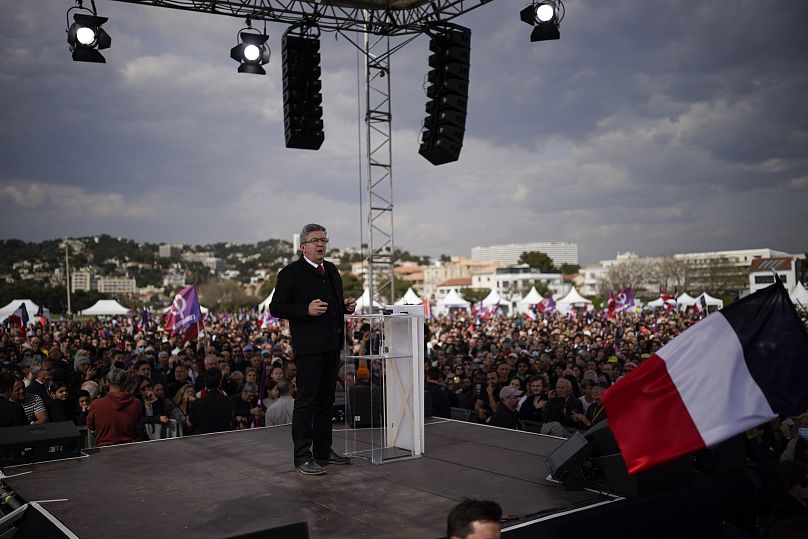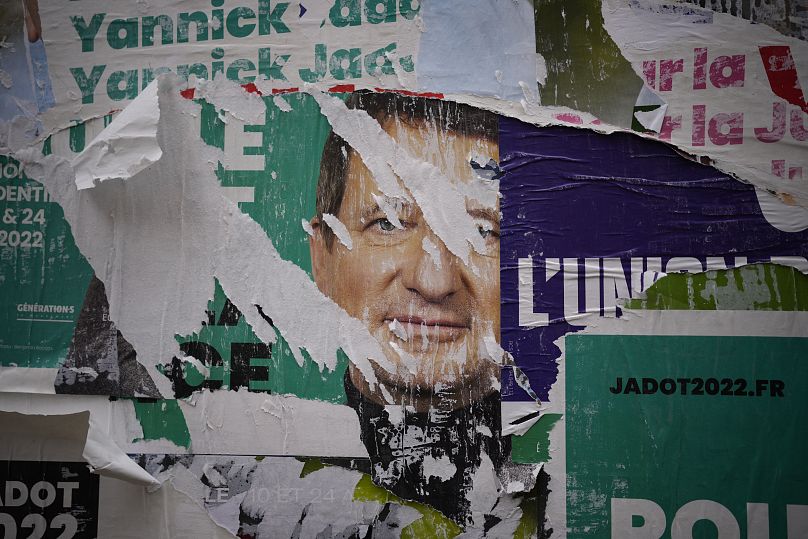France's Greens are polling at a mere 6% ahead of the country's presidential election on Sunday.
French voters consistently say that climate change is one of the most important topics in the presidential election but this hasn’t translated into greater support for the country’s green party.
Yannick Jadot, the candidate from France’s Europe Ecology-The Greens party (EELV) has recently been polling between 5-6% ahead of the first round of elections on April 10.
“His results probably won’t be much better than the Greens’ support in 2002 which is a bit surprising, because a lot has happened in terms of the environmental and climate catastrophes since then,” said Daniel Boy, emeritus research director at Sciences Po Paris' Centre for Political Research.
Greens candidate Noel Mamère had received 5.25% of the vote in the 2002 French presidential election, which remains to date the best performance by a green party in a French national election.
But much has changed, with the UN’s Intergovernmental Panel on Climate Change (IPCC) warning in 2021 that there was no time left to avert a climate catastrophe and a Paris court condemning the French government for climate inaction.
There were high hopes among some going into this race that the Greens would be able to increase their national support despite historically having a hard time in presidential elections.
In the 2019 European elections, Jadot’s party finished an impressive third in France, behind the far-right National Rally (RN) and President Emmanuel Macron's party, La République en Marche (LREM).
That success was followed up by the 2020 municipal elections, where the Greens took control of several major French cities such as Lyon, Marseille, Bordeaux, Strasbourg and Poitiers.
European parliamentarian Gwendoline Delbos-Corfield warned following those elections, however, that the party was still fragile and needed to gain more support at the national level, arguing that the real winners were right-wing mayors in rural communities.
Experts say there was room on the left for the Greens to take more voters, with the traditional left party, the Socialists, basically collapsing in 2017. But so far, they haven't really been able to do so.
Green candidates struggle to convince voters
For Boy, who is an expert on the Greens and environmental politics, the problem lies either with Jadot as a candidate or for ecologists more broadly in French elections.
“I think Jadot is quite a good candidate insofar as he presents himself very explicitly as a candidate who wanted to present a more or less pragmatic and not a very radical environmental programme,” Boy said, which he thinks was best for this campaign.
The Greens held their primary election earlier than other parties, in September 2021, with a second round between Jadot and Sandrine Rousseau, who presented a much more left-leaning and feminist programme.
Rousseau was then ousted from his campaign in early March after she heavily criticised Jadot’s strategists, calling them useless in an interview with the daily newspaper Le Parisien.
Mélanie Vogel, a French Senator and Jadot campaign spokeswoman, admitted that Rousseau's exclusion may have impacted the campaign.
"When in a team, we see that things are not really in tune, it rarely has a positive impact on the campaign," she told Euronews.
But Boy argues that Rousseau would also likely have had a hard time appealing to a wider electorate.
A BFM-TV/Elabe poll from late last year showed that French voters have the highest confidence in Jadot on environmental issues, but don’t trust him on other issues such as health, inequality or purchasing power.
Just two weeks ahead of the first round, the candidate made a blunder when he was quizzed on his knowledge of European geography by schoolchildren in a television special.
The European MEP struggled to place Lithuania and Estonia on a blank map and didn’t recognise Romania and Bulgaria as part of the European Union. The candidate later argued that he always struggled with geography while opponents used the moment to say he wasn’t prepared for France’s top job.
In general, “candidates from the Green party are not really seen in France as making a reliable president and do not have the stature of a presidential candidate,” said Boy.
Laure, a 54-year-old French voter who works at a hospital in Lille, told Euronews that normally she votes for the Greens but that this year she doesn’t like the candidate.
“Everyone is a little bit Green this year anyway, it’s trending,” she said. She agreed with her partner Philippe's sentiment that further environmental catastrophes would most likely force any future president to act on these issues anyway.
Campaign spokeswoman Vogel pointed out that environmentalists have never governed the country "people don't yet know what it would look like at the national level".
But she pointed out that environmental issues are related to every subject and that the next French president could "allow us to move towards a livable world or an unlivable world."
Romain Meltz, a political researcher at the Lumière University Lyon 2 who has been polling voters, says that when they think about climate change, they don’t think about it in the context of national elections.
“(French voters) don't think of global warming as an issue on which France can act. Instead in the last municipal elections, they voted because we have to prepare cities for the impact of global warming. And that’s not the same reasoning at all,” he said.
Another climate-friendly candidate in the race
For voters concerned about climate change, there’s another candidate that’s emerged as strong on ecological issues.
Environmental activists have validated two presidential programmes as having efforts that would work to effectively combat climate change: Jadot’s and that of far-left candidate Jean-Luc Mélenchon.
The leader of France Unbowed (LFI) has risen considerably in the polls to the third most popular candidate following Macron and Le Pen.
Boy says that young voters, who tend to be concerned about the environment, could gravitate more towards Mélenchon who is seen as a good orator with a more radical programme that appeals to younger voters.
“It’s the only programme on the left that’s coherent,” said Arnaud, a 25-year-old engineer who lives in Lyon, of Melenchon, saying that the candidate had convinced him on other key issues on the left in addition to the environment.
Anne Bringault, the project coordinator at Reseau Action Climat, a group bringing together 36 climate change organisations, said there are a lot of things in common about the two programmes but what differentiates them is the approach.
"Jean-Luc Mélenchon puts a lot of emphasis on public service issues, so the role of the state is stronger with public transport reinforced by the creation of a public energy centre whereas Yannick Jadot talks about regulating companies. He also talks about a ban on the sale of petrol and diesel vehicles by 2030,” said Bringault whose organisation rated all of the candidates' programmes.
She added that it can be hard for non-experts to know what’s needed to combat climate change.
“It's very complicated to understand, to have an understanding of the extent of the transformations to be made, suddenly, to see if the measures that have been taken and are sufficient or not,” she said.
“The only candidates with credible solutions are the ecologists and then Mélenchon.”
France’s system prevents small candidates from succeeding
Many analysts argue that the French system has prevented the Green party from gaining support in national elections.
In comparison with other European countries, where Green parties have been able to forge majorities with other social-democratic parties, France stands apart with its presidential election.
“We have a system in France that is still very centred on one person. So, I think that's a big game-changer and it sure forces voters to focus on one person and not necessarily really actually discuss the projects or ideas,” Bringault said.
She’s been disappointed with the presidential debate so far, which she says has been void of real conversation on environmental issues, with multiple right-wing candidates drawing attention to security and immigration.
Bringault says that since Sarkozy's 2012 loss, right-wing candidates have strayed away from offering credible solutions on climate change.
French senator Vogel also said that low voting intentions for the Greens are in part due to the little time given to climate change which is a "huge problem because it's the essential question of the century."
The Jadot campaign spokeswoman added that the majority voting system "does not lead to a real representation of political opinion in the country."
The French "vote to eliminate potential candidates in the second round," Vogel said, saying voters often pick candidates who have the best chance of advancing instead of their first choice.
But the flailing support for the Greens is also representative of a much larger problem for France’s left-wing, which is floundering at around 26% of the vote split between six candidates.
A citizen effort had attempted to rally the left-wing parties around a single candidate but none of them could agree to drop out of the presidential race, especially since it sets the stage for the June parliamentary election.
The left-wing has been particularly marked by the spectacular disappearance of France’s Socialists, who despite winning the 2012 elections with François Hollande, are now polling at a mere 2%.
It’s something that many thought could benefit other left-wing parties, but that hasn’t really happened.
“The Greens haven’t benefited from the demise of the Socialist Party,” Boy explains. “The left-wing voters that went with Macron haven’t returned to the left, which isn’t what the left had wanted.”
Boy says that if Macron is reelected, there will be a reset on the left, but that it’s hard to say if the ecologists will emerge from it as a dominant party.














